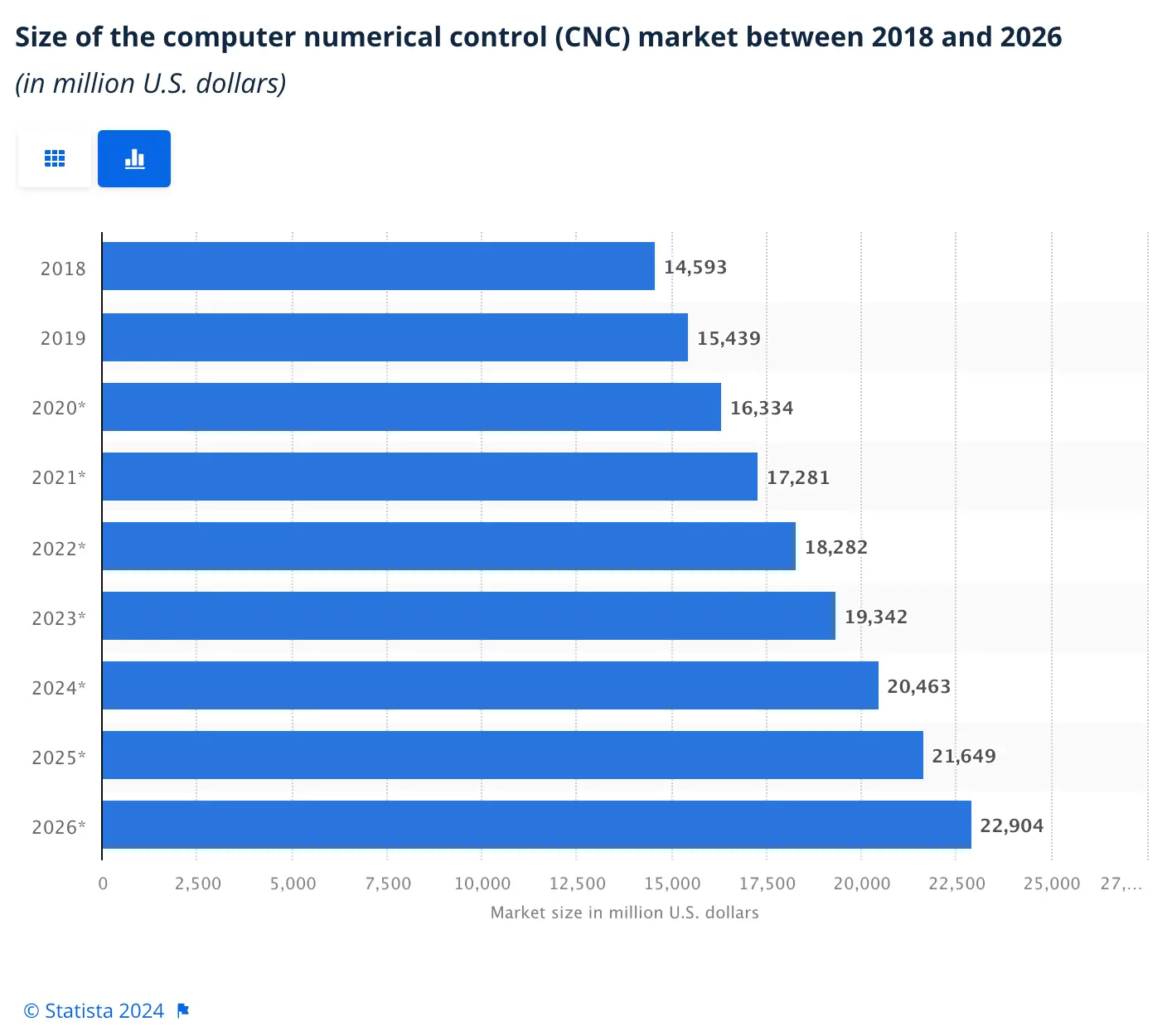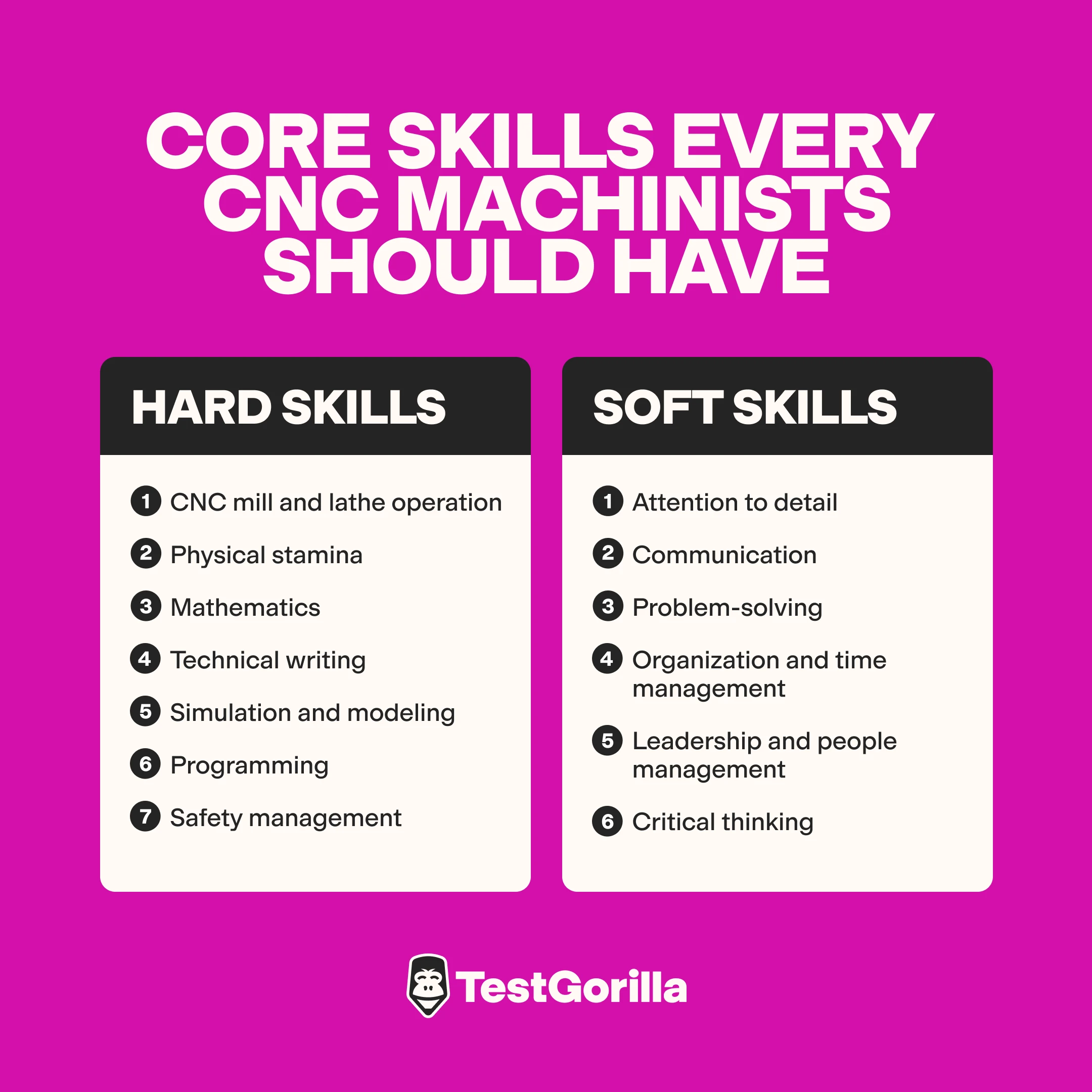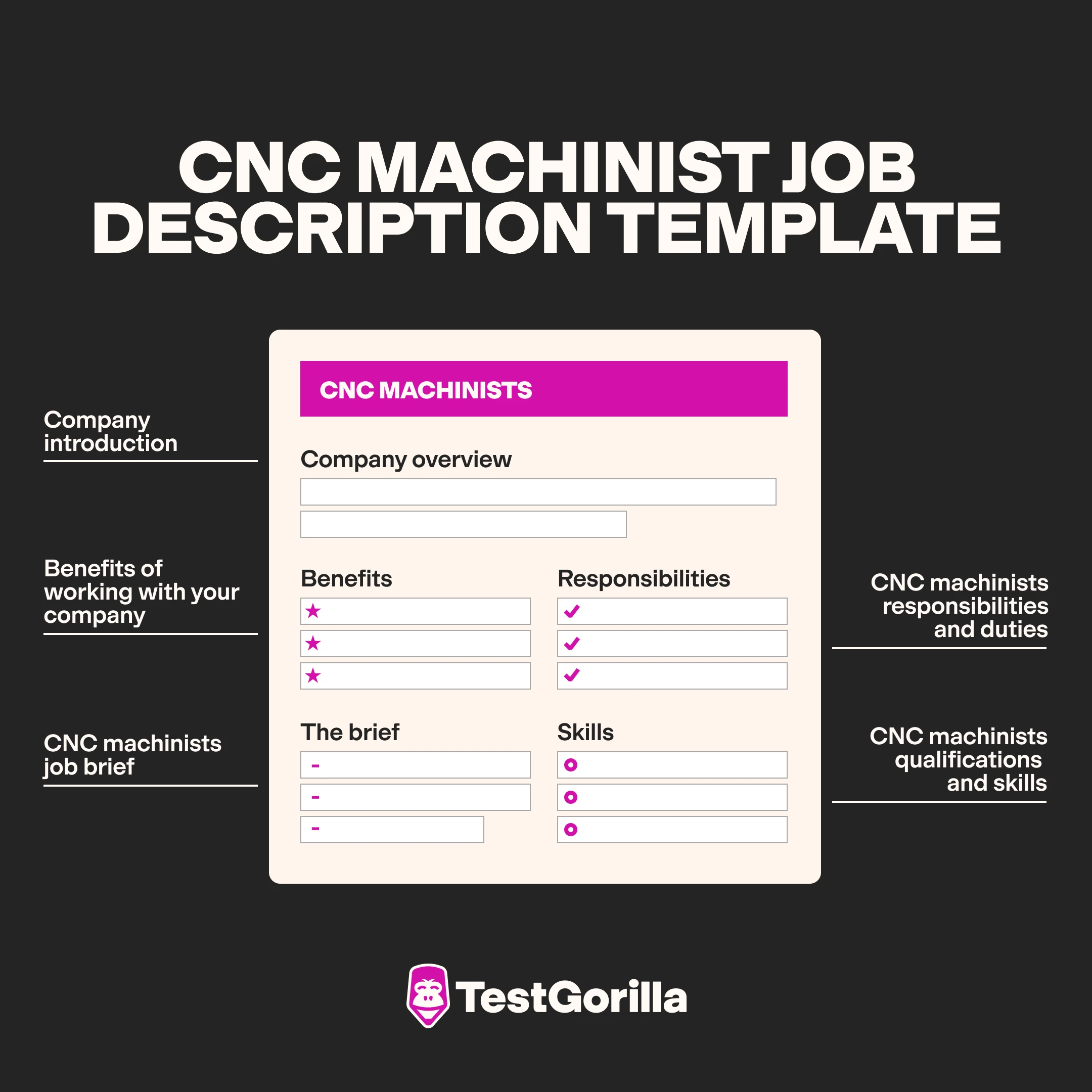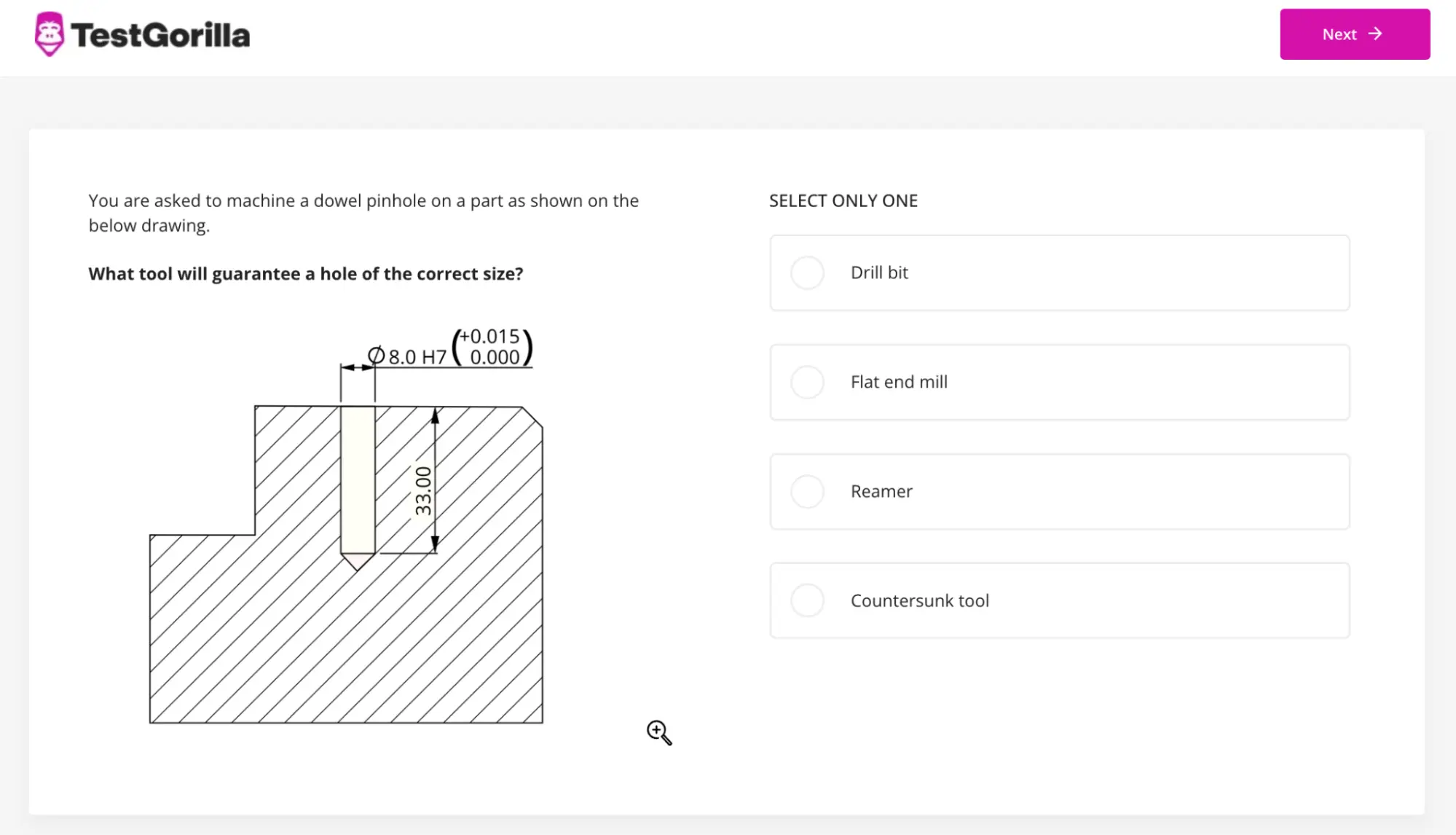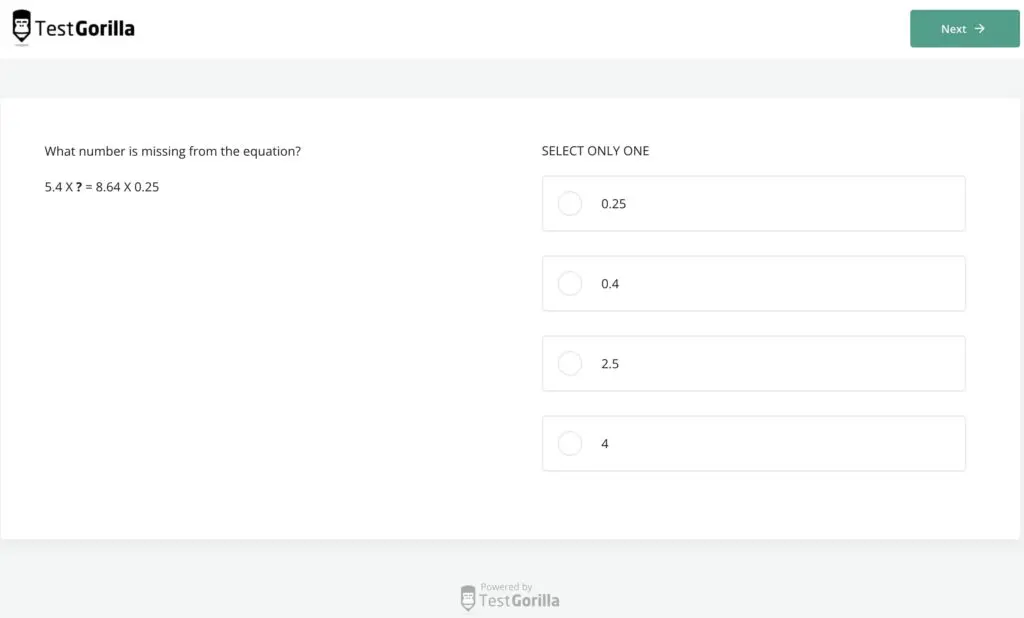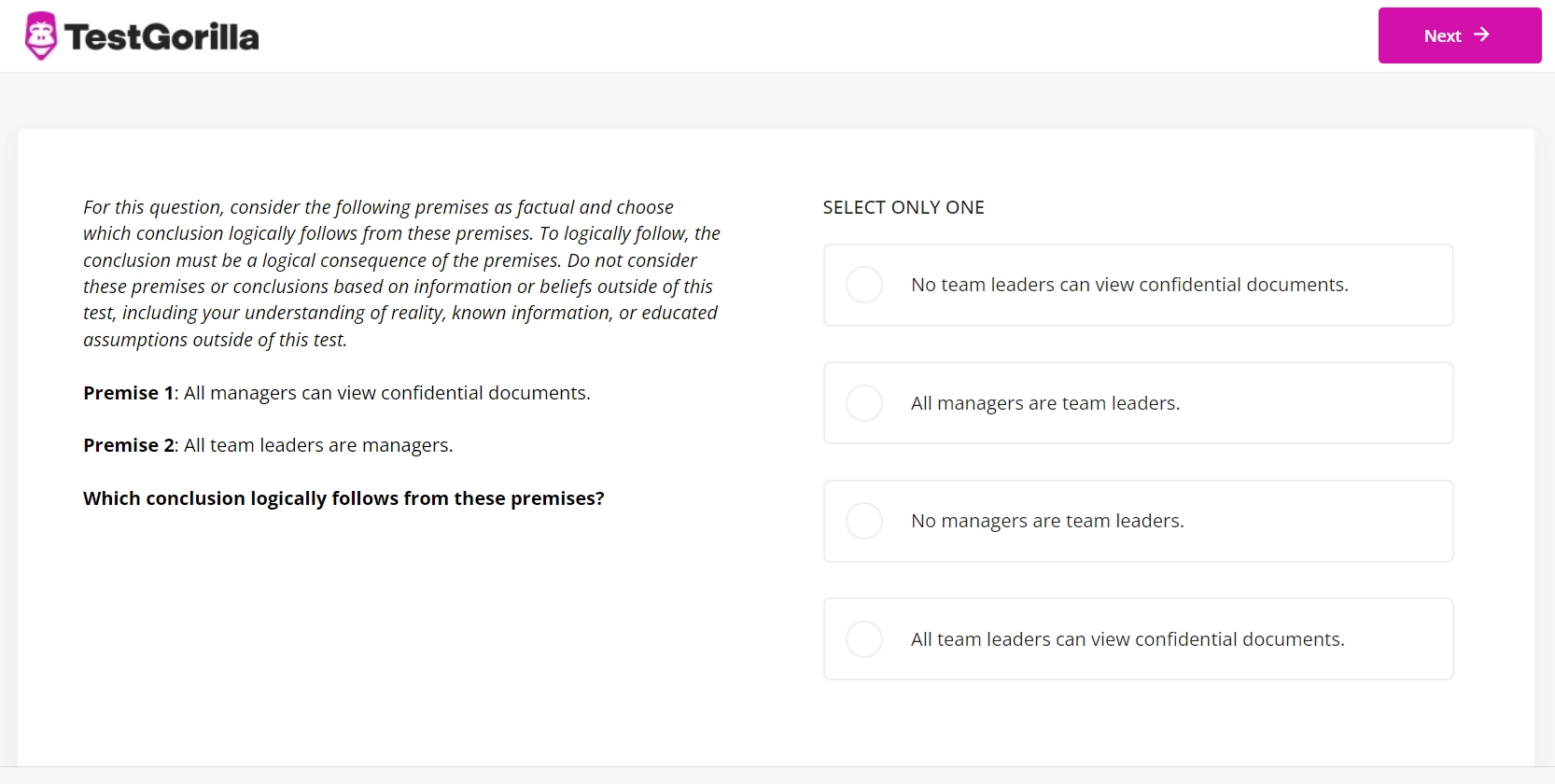Let the best CNC machinists show you their skills.
When making custom parts for construction and manufacturing, specialized software is a must.
This means you need to hire skilled workers to use these programs, and that’s not easy when you focus on resumes and years of experience – those don’t necessarily indicate a job seeker’s competency.
To filter in the truly skilled applicants, you must write a knockout CNC machinist job description and then test your applicants’ skills with talent assessments!
To help you find the perfect candidate, let’s explore what to include in the ideal CNC programmer job description, the average CNC machining salary, and the skills to focus on.
Table of contents
- CNC machine operator job description: What is a CNC machinist?
- 13 top skills to look for in CNC machinists
- How to write an attractive machinist CNC job description: 3 tips
- CNC machinist job description template
- CNC machine technician salary
- Next steps: Attract and assess CNC machinist candidates with TestGorilla
- Hire top talent with an attractive CNC machinist job description
- CNC Machinist / CNC programmer job description FAQs
CNC machine operator job description: What is a CNC machinist?
A Computer Numerical Control or CNC machinist is a professional who uses computer-aided manufacturing to design and create precision parts in the construction and manufacturing industry. CNC operators use specialized software to control tools like routers, mills, and grinders.
“CNC machinist” refers to most people who use this software. The difference with a CNC programmer is that they write programs, too. Otherwise, machinists normally use pre-programmed software.
CNC machinists typically work in:
Aerospace
Defense
Electronics
Firearms
Marine industry
Medical
Optical
Oil and gas
Automotive
The CNC market is booming! It’s growing past $22bn mid-decade, and the competition to find people with specialized skills has never been tougher.
Around 8.9% of machinists list CNC skills when applying for specialized work. However, let’s break down the specific skills your applicants should show off during hiring.
13 top skills to look for in CNC machinists
As a highly technical role, there are many hard skills to list in a CNC machine operator job description, such as managing a mill and understanding technical writing.
However, don’t forget about soft skills: CNC machinists work with many different teams, meaning you need to hire great communicators who can organize their time wisely and think critically.
Let’s review the most important skills to include in your CNC lathe machinist job description.
Hard skills
Skill | In brief |
CNC mill and lathe operation | Using specialized software equipment to produce materials, parts, and pieces |
Physical stamina | Carrying heavy loads and managing unwieldy equipment |
Mathematics | Precisely calculating and measuring specifications and blueprint reading |
Technical writing | Writing instructions for machining processes using technical language |
Simulation and modeling | Using software to simulate products and raw materials before physically designing and cutting |
Programming | Inputting complex instructions into CNC programs to produce accurate results |
Safety management | Using tools safely, being aware of others, and wearing appropriate protection |
Soft skills
Skill | In brief |
Attention to detail | Reading and understanding complex blueprints and instructions and spotting potential flaws |
Communication | Collaborating with other CNC operators and sharing instructions and updates with different audiences |
Problem-solving | Being able to interpret complex data and using CNC software to design and build parts |
Organization and time management | Managing your own workloads in line with team and project demands |
Leadership and people management | Instructing other team members and supporting CNC machinists working on the same project |
Critical thinking | Looking objectively at ways to solve design and manufacturing issues |
Hire talented CNC machinists
Skills tests help you discover highly skilled CNC operators objectively and bias-free. Book a live demo, and one of our friendly experts will show you how to get started.
The best insights on HR and recruitment, delivered to your inbox.
Biweekly updates. No spam. Unsubscribe any time.
How to write an attractive machinist CNC job description: 3 tips
The best job descriptions for any role are clear, concise, and specific. You need to ensure your CNC hires understand what they’re getting into and have the skills you need.
An attractive CNC machinist job description appeals to genuinely talented people. Ideally, your machinist CNC job description should:
Be clear on technical responsibilities and expectations
Emphasize skills discovery
Be clear on the scope
1. Be clear on technical responsibilities and expectations
Always be specific about the hard skills you expect from your candidates. By being transparent, you attract talented people who can easily back up their applications.
Make it clear that you expect recruits to:
Study and produce technical drawings
Program mills and lathes
Load and monitor machines
Observe machinery safety
Record actions taken
Troubleshoot errors and damages
2. Emphasize skills discovery
Most employees prefer skills discovery to traditional experience checks, and 86% believe this helps them unlock dream career opportunities.
Revealing that you test for skills helps filter out people likely to lie on their resumes and bluff their way into sensitive work. Around 18% of people lie about their skills on their resumes, so you’re seriously reducing the chance of a bad hire.
Finding genuinely skilled CNC machinists is getting increasingly difficult in the US. Therefore, avoid leaning too heavily on resumes for their face value.
3. Be clear on the scope
Defining the scope in your job description ensures you find applicants who are confident and comfortable with what you expect from them.
Getting specific helps you find people who are not only up to the challenge but who can hit the ground running quickly.
For a junior CNC programmer job description, you might need hires to:
Are detail-oriented and follow specific technical instructions
Be able to lift items and tools up to 30 pounds
Focus on concentricity, parallelism, and squareness in specific instructions
CNC machinist job description template
Here’s where you show your applicants what makes your position stand out from the crowd.
Using our CNC machinist job description template below as a starting point, advertising is quick and easy.
Here’s what we recommend you include.
Company introduction
Start by showing your applicants who you are and what you stand for. Explore some of the projects and products you help to produce through CNC and describe the work environment they should come to expect.
Now’s a good time to explore how CNC machinists help your firm succeed. Could you share a quick example, such as how the parts they design and make help to improve vehicle safety?
Benefits of working with [your company]
Talented machinists with many job opportunities want to work for a firm that offers more than a basic CNC machine technician salary and a rewarding environment.
So, share details about your:
Paid time off – is it unlimited or highly competitive?
Training programs
Learning and development
Healthcare
Flexibility for remote workers, parents, and students, for example
Retirement plans
In-house perks such as fitness facilities and childcare
CNC machinist job brief
Include the following, filling out details relevant to your role and business:
[Company name]
Job Title: [CNC machinist]
Reports to: [Principal or lead CNC machinist]
Position type: [Part-time, full-time, or temporary]
Location: [On-site, remote, or hybrid]
[Quick details about salary and benefits]
CNC machinist responsibilities and duties
List the specific jobs and responsibilities you expect from the successful candidate. You could include:
Analyzing and problem-solving for blueprints and sketches
Controlling specific machine tools and following their processes
Designing parts and products based on specifications drafted in software
Assembling, welding, and drafting final products to fulfill work orders
Inspecting equipment regularly to ensure safety and quality control
Communicating with other team members to develop products
Taking inventory by checking available material and making orders
Loading and unloading feed mechanisms
Checking settings by running test pieces and ensuring positions are correct
CNC machinist qualifications and skills
Here’s an example of the required and preferred skills and experience you could pitch for in your job description.
Required skills and experience
Ability to program and use CNC mills
Strong communication skills
Excellent attention to detail
Manual dexterity
Ability to lift [X weight here]
Mathematical skills
Critical thinking and people management skills
Preferred skills and experience
Familiarity with specific tools and software
Certification or qualification in CNC machinery
Ability to prepare and use CNC tools without supervision
CNC machine technician salary
On average, a CNC machinist in the US makes $48,750 annually, starting at around $41,700 and reaching $62,000.
The average CNC machinist's salary varies from state to state and is dependent on industry. For example, the lowest average salary is in Oklahoma, where a CNC machinist can expect to make just short of $42,000 per year. On the other side of the scale is Hawaii, where an average CNC machinist earns more than $68,000 a year.
In addition to CNC machinists’ salaries, benefits such as bonuses and profit sharing should be considered.
Next steps: Attract and assess CNC machinist candidates with TestGorilla
Your CNC machinist job description is now ready to upload to job boards. Consider other ways to advertise the role, too – such as through an internal marketplace or setting up employee referral programs.
Once your job ad is live, prepare for applications with a skills discovery plan. Once you get applications from people with the skills you need for CNC work, we recommend you let candidates show you what they can do.
Objective skills discovery ensures you have more reliable data for making hiring decisions, which is naturally important when hiring for highly technical jobs.
Take Solid Solutions Management’s case study as an example. Working with TestGorilla, the engineering firm used skill discovery to boost the number of entry-level graduates it confidently hires – with 95% of placement students finding full-time work in the business.
TestGorilla’s assessment builder lets you create a custom plan based on up to five specific tests. That means you can include a mix of hard and soft skills alongside personality tests so you can learn more about whether or not a candidate adds to your culture.
You can explore the test builder with a Free Forever account – and play around with the following recommended tests for CNC machinists:
CNC Machinist tests
Our Metric CNC Machinist test is great for assessing knowledge and experience in CNC operation and programming. You can explore applicants’ knowledge of specific CNC techniques and how to use specialized machinery:
We provide an imperial version of the test, too.
Intermediate Math test
This Intermediate Math test lets applicants prove their equation-solving skills and explores their ability to handle complex ratios, fractions, dimensions, and percentages. A good handle on math is important for CNC machinists to interpret and write instructions and deliver precise results.
For more preview questions, please check out our preview Intermediate Math Test.
Critical Thinking test
In this test, you can judge an applicant’s ability to analyze problems with objective reasoning.
It’s a great way to find talented CNC machinists who carefully analyze problems using facts and make sound decisions under pressure.
Communication test
CNC machinists communicate with various people at different business levels. This means they need to translate technical information, ask questions, and support any important decisions they make.
Our Communication test ensures you hire a machinist who excels in written and verbal communication and actively listens to others.
Take a look at some sample questions from this test and see how we measure this soft skill up close.
Culture Add test
Finally, we recommend using a Culture Add test as part of your custom talent discovery plan. This exam helps you find a machinist who makes ethical, reasoned decisions that match your company’s ethos and mission while adding value to your team.
There’s a key difference between culture fit and culture add. Instead of just “fitting in,” someone who adds to your culture brings innovation and fresh perspective while holding the same values, helping your company to evolve.
Add all five of these tests together in a custom assessment plan and share it with applicants via email or IM. They can complete tests remotely, and you receive scores to compare and assess.
Use TestGorilla to unlock the power of talent assessments.
Getting started is quick, easy, and 100% free. Just sign up, and you can start browsing through assessments that are perfect for hiring your next CNC machinist.
Hire top talent with an attractive CNC machinist job description
Hiring talented CNC operators isn’t easy. You need a CNC machinist job description that’s clear, concise, and based on talent assessments.
Through skills discovery, applicants can prove their expertise in this highly technical specialism. Why waste time and effort hiring poor candidates based on experience alone?
If you’re looking for a complete guide to hiring a CNC machinist, be sure to check out the article linked for more insight.
In the meantime, why not try TestGorilla and start discovering skills?
It’s free to join and explore.
If you’d rather take a guided tour of TG and learn more about its capabilities, jump straight into our product tour.
We don’t blame you if you’d prefer something a little more customized, so let us show you how TestGorilla can transform your CNC hiring process with a 30-minute demo..
CNC Machinist / CNC programmer job description FAQs
Let’s close with some final questions and answers regarding how to write a CNC machinist job description.
What is the difference between a CNC operator and a CNC machinist?
A CNC operator usually runs CNC machinery and ensures high-quality products, while CNC machinists tend to have broader knowledge and responsibilities. For instance, a CNC machinist often knows how to modify and adjust machines and software and has exceptional problem-solving skills.
What are the skills of a CNC?
Mathematics and IT skills
Practical machinery skills
Problem-solving
Attention to detail
Critical thinking
Time management
Technical writing
Computer programming
Physical strength and fitness
Communication
Read more about the skills typically required of a CNC machinist or programmer from our complete guide above.
What is a CNC operator's job description?
A CNC operator’s job description is to use software and CNC equipment to design, drill, mill, and grind parts and tools for use in manufacturing and construction. A CNC machinist must also read and understand blueprints, translate mechanical data, and collaborate with designers, programmers, and engineers to produce consistently precise parts.
Use our template to write a CNC machinist job description that covers all these bases.
What are the education requirements for a CNC machinist?
A CNC machinist typically requires a high school diploma or GED. An applicant can also gain further certification through a trade school, community college, or organization such as the National Institute for Metalworking Skills (NIMS).
You've scrolled this far
Why not try TestGorilla for free, and see what happens when you put skills first.



